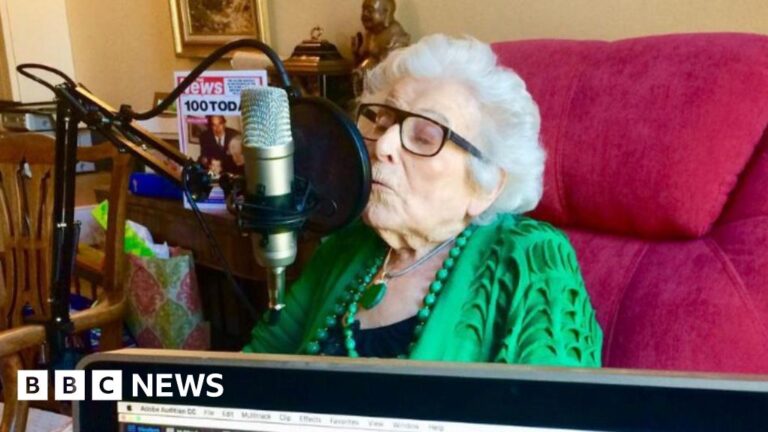Image source, Life Story Recording
Article informationauthor, Danny Fullbrookrole, BBC News, Hertfordshire
July 6, 2024
As podcasts become a more popular medium, families are turning to the format to remember loved ones who have passed away.
According to YouGov data, 40% of people surveyed listen to podcasts for more than an hour per week.
In the UK, several companies now offer services to record extended audio interviews with relatives as keepsakes for future generations.
Those who have explored this new medium have explained how the technology has helped them.
“He's in my room again.”
Image source, Life Story Recording
As Joan Berry drives alone, she listens to her father talk about the birth of his children, his time in the military and the time he saw a plane being shot down during a bombing raid on Britain.
Originally from Kettering, Northamptonshire, Bill Berry was born in 1933 and recorded the podcast when he was 83 years old. He passed away in 2020.
She said: “I love hearing my dad's voice. It's like he's in my room again, telling me funny stories.”
“Now that my father has passed away, hearing his voice is a rare experience that brings his story to life.
“It's me, Dad. I'm the real deal. My sister said it was so special to hear that her birth was the best day of her dad's life.
Image source, Joan Berry
Berry feels he has a legacy to pass on to future generations, like his granddaughter.
“We tell her about my dad, she sees him in photographs, but having his story documented really brings him to life.
She will get to know his sense of humor and I look forward to continuing to have conversations about him.”
“My mother's memories were fading.”
Image source, Life Story Recording
Sylva Richardson, from Walkerne, Hertfordshire, was born in Brocket Hall in 1940, when the house was used as a maternity hospital during the Second World War.
This is one of the stories she told when she recorded her experience, then aged 79.
His daughter Julie Lucas, 56, of Stevenage, admitted she did not realise how significant the recording was at the time.
“I knew my mother's memory was declining, but it wasn't until six months later that she was diagnosed with Alzheimer's,” she said.
“I heard stories I'd never heard before. I knew she had a donkey, but she started talking about memories of riding a donkey to pick her up from school.”
Image source, Julie Lucas
It was recorded in August 2019, and she passed away in March 2021.
The finished product includes some of her favorite music, including Sergei Prokofiev's “Peter and the Wolf.”
“To be able to access these little stories and be able to play them and hear her voice again, you don’t realise what a wonderful keepsake it is until you lose that person.
“To go back and hear her voice is so powerful for me and for my kids.
A century-old story
Image source, Patrick Hay
Katori Hay, from Brentwood, Essex, received a unique gift for her 100th birthday: the opportunity to record her life story as a podcast.
Born in 1919, she shares her memories of the first commercial flight and offers advice based on a century of experience.
Patrick Hay, who now lives in France, admitted he doesn't listen to the recordings because he prefers his memories of her as a young man, but to him their value lies in future generations.
He said: “It's a new kind of family history document, and I think it will be important to my mother, to me and to her grandchildren many years down the line.”
“I think this is for people who didn't have a chance to know her.”
“A celebrity, but not someone we love.”
Image source, Life Story Recording
One company offering a service to record the memories of loved ones is Life Story Recordings, which is based in Hertfordshire but operates throughout the UK.
Founder Dave Creasey was working as a radio producer when he heard from an acquaintance that he had been listening to answering machine messages for comfort after his son had died.
“I think audio is the most powerful and intimate medium,” he said. “It conveys laughter, the mispronunciation of words, the very subtle but very important details that make up who we are.”
“Podcasts are booming at the moment, with many of us enjoying hearing the life stories of our favourite actors and singers, and this is a chance to offer just that to our parents and grandparents.
He explained that the podcast format works better because people are more relaxed and can speak more naturally when the camera isn't on them.
“With today's technology, we can all keep a record of our loved ones in some way, and I encourage people to do so in whatever way they can.”
But I think people are beginning to see the value in doing this professionally in a way that will last for years to come.”


